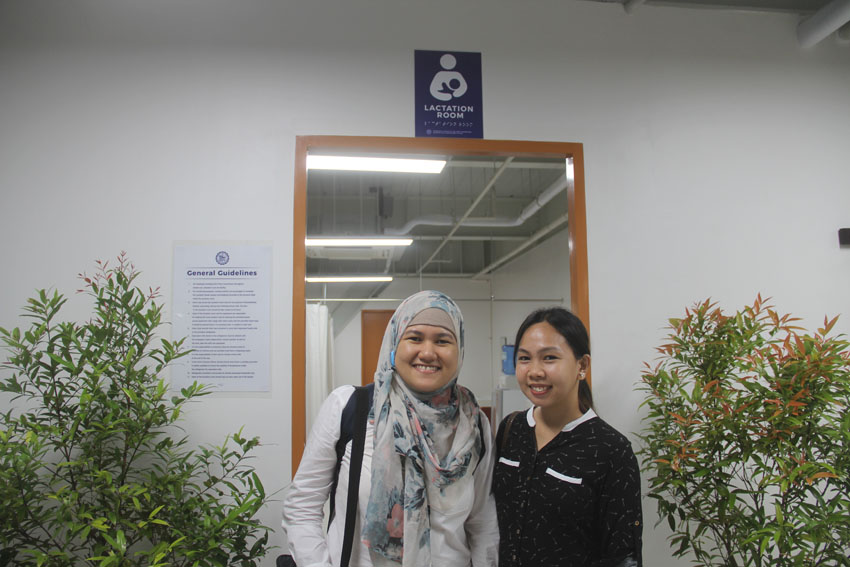
Engineers Lynith Datukon and April Salazar pose outside the new lactation facility at the Ateneo De Davao University along Roxas Avenue, Davao City. The university opened their first lactation facility on Monday, April 10, 2017. (Zea Io Ming C. Capistrano/davaotoday.com)
DAVAO CITY, Philippines (Updated as of 3:58 pm, April 11, 2017) — Engineers Lynith Datukon and April Salazar are both working mothers who face the challenges of breastfeeding while at work.
Datukon, 30, is a faculty member and chairperson of the Civil Engineering Department of the Ateneo de Davao University whose son is only seven months old.
“While I’m in school, I pump milk and my son directly nurses from me when I get home,” she said.
Datukon said after her two-month maternity leave, she started expressing milk to take back home to her child.
“At first I pumped milk inside the comfort room, but it was unhygienic,” she said.
Datukon said when her co-teachers found out her difficulties, they put up a makeshift cubicle inside the faculty room to provide her a private space.
Salazar, 32, a faculty member teaching students of Electronics and Communications Engineering, also faces the same problem of where and how to express milk for her two-month old child.
She said she hopes to find a clean and comfortable space where she could start expressing milk for the baby.
But tomorrow, Datukon and Salazar can already use the newly-launched lactation station inside the faculty workspace at the fourth floor of the university’s community center building along Roxas Avenue.
The station is available for all employees including part-time, contractual and agency workers.
First in the region
City Health Officer Dr. Josephine Villafuerte said the lactation station of the Ateneo is the first in all academic institutions in the region after 17 years since the approval of the of the Expanded Breastfeeding Promotion Act of 2009.
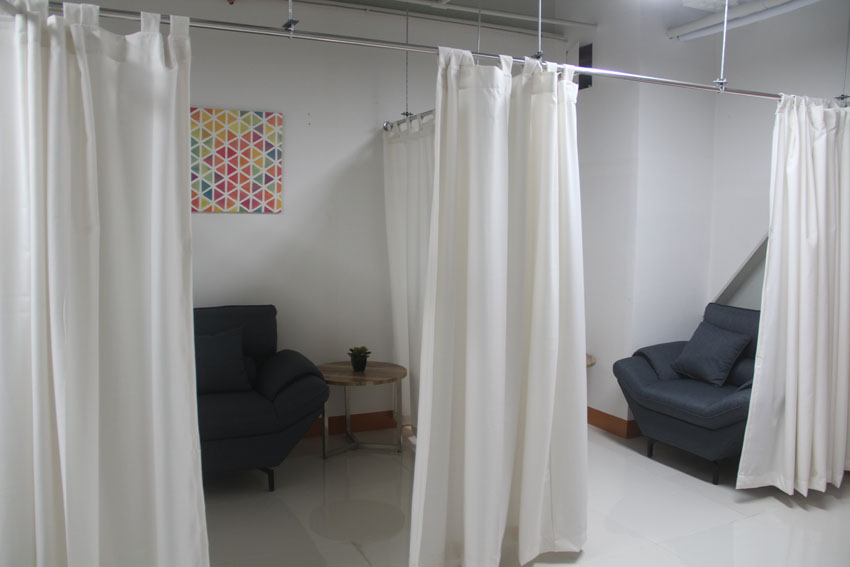
The lactation room at the Ateneo de Davao University in Roxas Avenue has two rooms where mothers can nurse their babies or express milk for storage. (Zea Io Ming C. Capistrano/davaotoday.com)
“This is the first (lactation facility) among schools in Region 11,” Dr. Josephine Villafuerte, City Health Officer told Davao Today.
The room has two nursing stations, a refrigerator, a table for diaper change, two hospital-grade breast pumps and a lavatory.
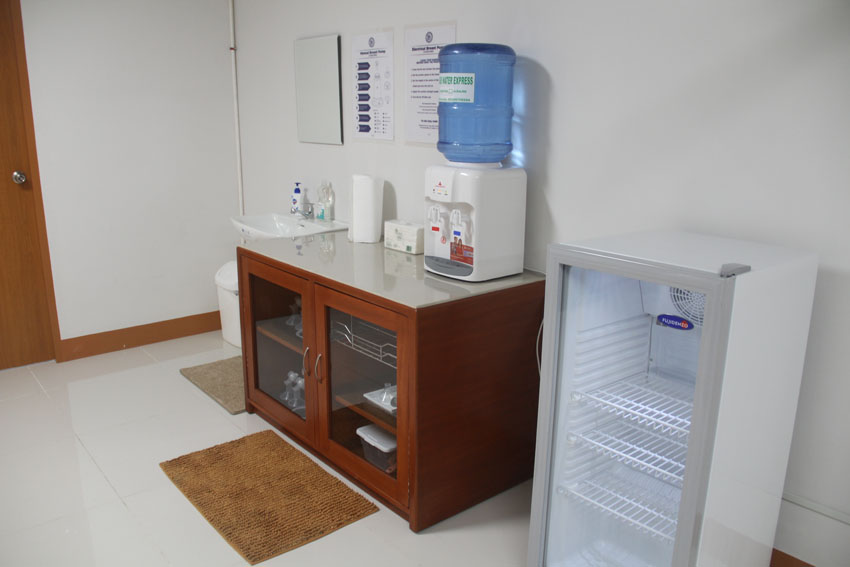
The lactation facility also has a lavatory, a refrigerator, and two hospital-grade breast pumps which the school employees may use for free. (Zea Io Ming C. Capistrano/davaotoday.com)
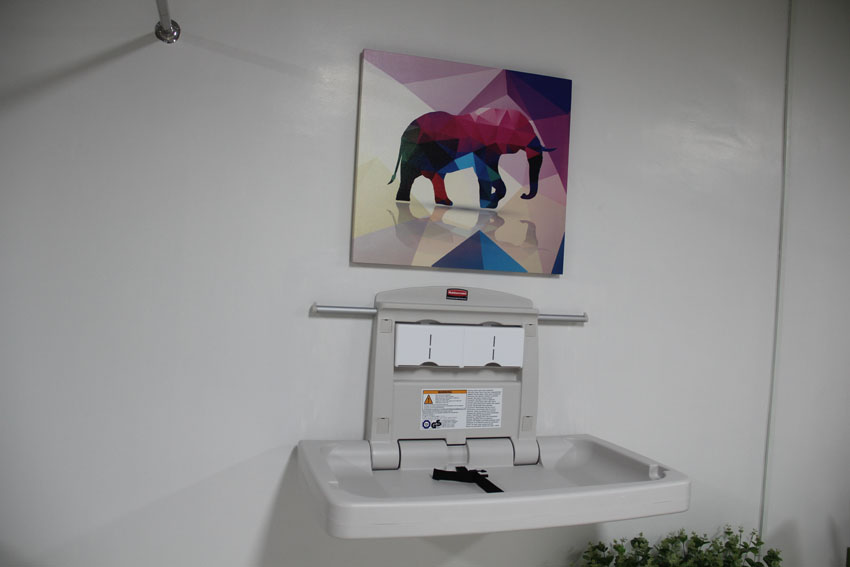
A table for diaper change is also available inside the lactation room. (Zea Io Ming C. Capistrano/davaotoday.com)
Villafuerte said the establishment of lactation rooms are provided under Republic Act 10028 or the Expanded Breastfeeding Promotion Act of 2009 which was approved on March 16, 2010.
Under Section 6 of the law, the establishment of lactation stations is mandated for all health and non-health facilities, establishments or institutions.
The law further states: “The lactation stations shall be adequately provided with the necessary equipment and facilities, such as: lavatory for hand-washing, unless there is an easily-accessible lavatory nearby; refrigeration or appropriate cooling facilities for storing expressed breastmilk; electrical outlets for breast pumps; a small table; comfortable seats; and other items, the standards of which shall be defined by the Department of Health. The lactation station shall not be located in the toilet.”
The law also prohibits the direct and indirect promotion, marketing and sales of infant formula or breastmilk substitutes within the lactation stations.
Compliant with law
Atty. January Faye Risonar-Bello, Assistant for Research and Advocacy said the school’s institutionalization of the lactation room is part of the “work and life balance” for the employees.
She said she prepared and submitted a position paper to University President Fr. Joel Tabora about the existing law and the establishment of lactation rooms in the campuses.
“We wanted to make sure that the establishment complies with the existing laws,” Risonar-Bello said.
The office of the Human Resource and Management Department then translated the position paper into a school policy for the benefit of the employees.
Lack of space
However, Villafuerte said that while they encourage establishments to have a lactation room, some establishments “lack the space” to put one.
“For workplaces they should put up a lactation room for their employees or provide a facility where the employees can keep the breastmilk,” she said.
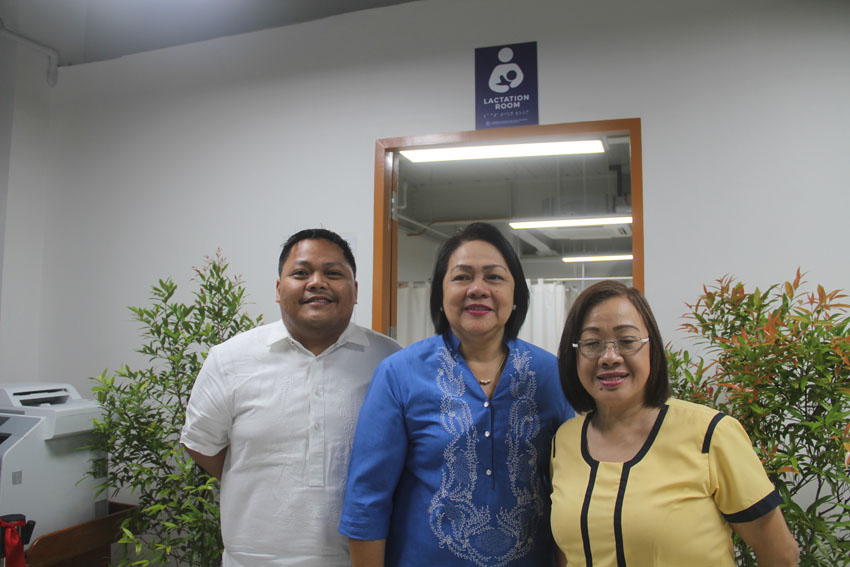
(From left to right) Atty. Nice Solis, Human Resource Director of the Ateneo de Davao University, Dr. Josephine Villafuerte, City Health Officer and Chona Dizon, Nurse Program Manager of the Mother-Baby Friendly Hospital. (Zea Io Ming C. Capistrano/davaotoday.com)
A lactation station, she said, helps in providing a continuous supply of milk for the babies.
“Besides, we know that breastfeeding is the one that is best for babies,” she said.
Lactation period
Under the law, employees who are still nursing should be granted break intervals not less than a total of 40 minutes for every eight-hour working period.
“These intervals, which shall include the time it takes an employee to get to and from the workplace lactation station, shall be counted as compensable hours worked,” it said.
Any violators of the law which refuses or fails to comply shall pay a fine of not less than P50,000 to P1,000,000 and may face the cancellation or revocation of the business permits or licenses to operate.
Need of mothers, babies
Alex Hao, founding member of Latch Davao said the lactation station “recognizes the need of mothers and babies.”
“The space is not just space but an acknowledgment not only of work life balance but maternal and child health priorities,” she said.
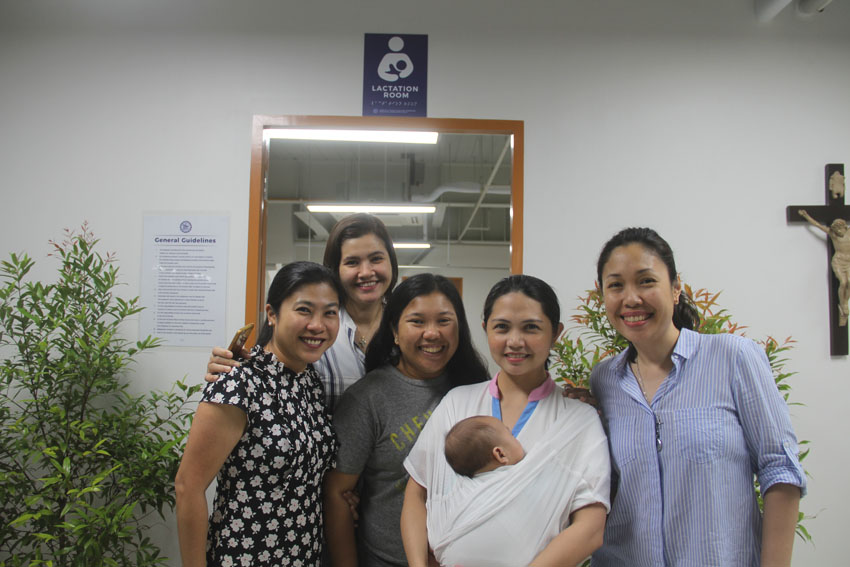
Members of Lactation Attachment Training Counseling and Help or LATCH Davao grace the opening of the lactation room of the Ateneo De Davao University. (Zea Io Ming C. Capistrano/davaotoday.com)
Hao said companies should see to it that a lactation room is available for women workers to develop a culture “that recognizes the needs of working mothers and their babies.”
“There is so much that working mothers are already doing. A space such as this is such a small investment given the ripple effect it can have for working women, their babies and by extension, their families, community and if more companies follow suit then the entire country,” she said.(davaotoday.com)










